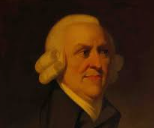I keep hearing people throw around comments about Adam Smith as if they have read closely all his work and understand what he was trying to say with his writings. There is the Adam Smith the caricature of capitalism and the Adam Smith of reality. Was he a great economist? He was able to popularize thinking about the economy as a system although he did not advance economic theory. The Wealth of Nations was written in 1776, before the great industrial revolution. You could say he was bringing the principles of the enlightenment through logic and observation to explain the economy; however, he was foremost a moral philosopher.
You cannot think about the Wealth of Nations without knowing his earlier work, The Theory of Moral Sentiments. If the Wealth of Nations describes the economy and how it works or should work. The Theory of Moral Sentiments which came out in 1759 explores how decision should be made by individuals within the economy.
He develops the idea of the impartial spectator. All that you do should be judged by a neutral observer who is looking over you. You should be judged by or seek the approval of the neutral observer who can help us decide what is the right thing to do. The effective machinery of capitalism works best not based on the invisible hand but the impartial spectator who will guide the course of action that will maximize all welfare. The economy is not a jungle, but an environment where self-interest is tempered by the observation of the outsider who is looking at our actions.

No comments:
Post a Comment